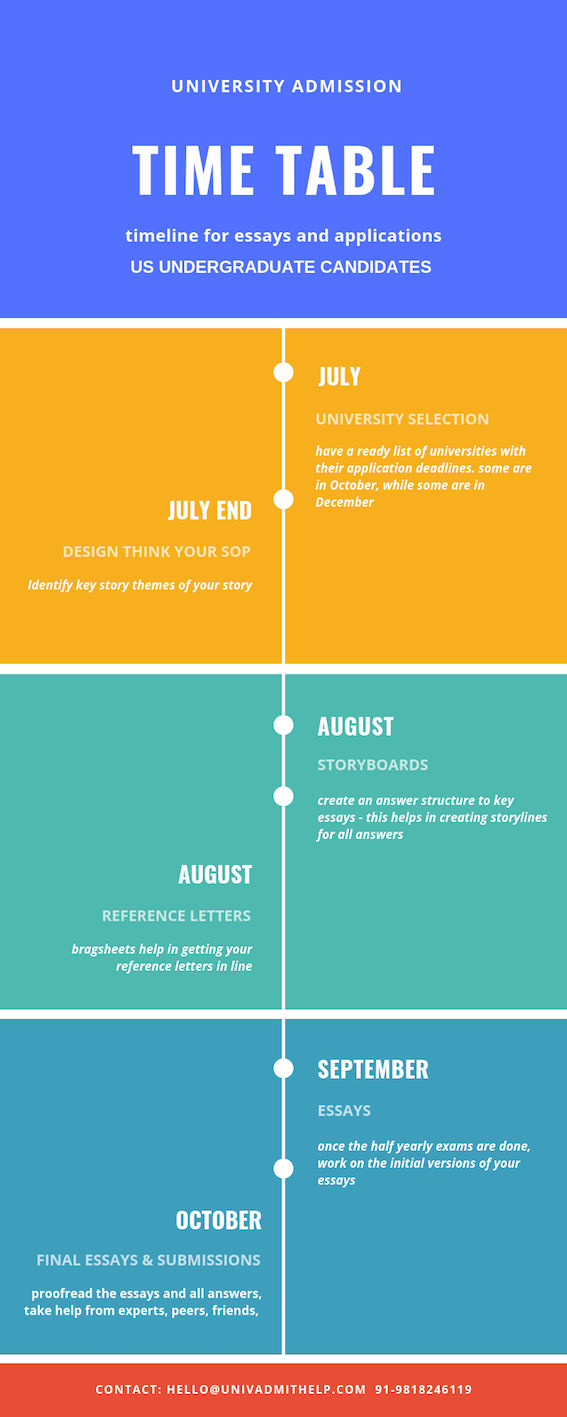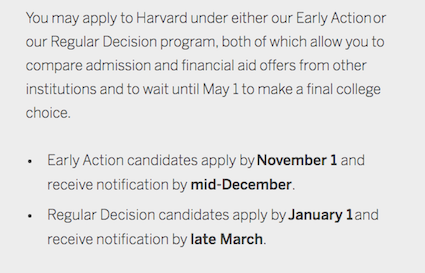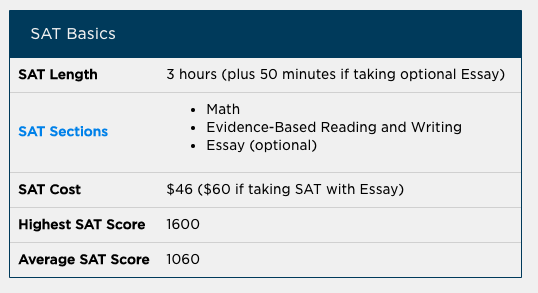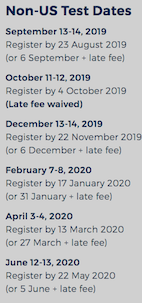So, you want to study abroad?
- Written by UnivAdmitHelp
- Category: Admission Application
- Published on 02 Oct 2019
APPLYING FOR UNDERGRADUATE COURSES IN THE US
(A timeline to structure your approach in the year leading up to admission)
(For a detailed list of the important components of the application process, read here)
“Let’s start from the very beginning,
It’s a very good place to start!”
Julie Andrews surely knew what she was talking about. In the case of college admissions as well, the first place to start would be a list of colleges.

- By the time July (in Grade 12) rolls around, you should have narrowed down the colleges you are trying for. Make a college list. It could be a combination of your dream colleges, courses, dream campus, available colleges, courses that you are eligible for. Make an exhaustive list which aims high.
- Discuss the following admission criteria in great detail with your counsellor over the summer break.
- EA Early Action/ ED Early Decision: Many courses offer an Early Action admission. This means an early date. While regular applications are made in December/January, EA deadlines are in October end.
- These are sometimes binding. If you are accepted in an EA course, and it is binding, then you are bound to join that course and that alone. Even if, unfortunately the scholarship you counted on doesn’t pull through, you are honour bound to join the course.
- They can also be non-binding. So make sure you know what you’re getting into.
- Single-choice courses are courses that do not allow you to apply for any other course if applying for this specific one.
- RD Regular Decision: December end is the usual deadline for most Regular Decision applications.
A screenshot from the Harvard application page for first year applicants outlines the differences:
3. Register, if you haven’t already, for standardized tests.
-
- SAT I, SAT II
- The scores of your SAT’s (1 and subjects, ACT’s, SAT2 are most critical. If you are not happy with your scores, resit. You can sit for the SAT’s more than once if you do not have the requisite marks. There is usually a fine balancing act between the value of time spent for improving the test scores vs. working on the essay and the rest of the application.
Usually, towards the end of the application process, it is advisable to spend more time to build on your application and work on the essays and answers instead of trying to improve test scores by just a notch.
- The scores of your SAT’s (1 and subjects, ACT’s, SAT2 are most critical. If you are not happy with your scores, resit. You can sit for the SAT’s more than once if you do not have the requisite marks. There is usually a fine balancing act between the value of time spent for improving the test scores vs. working on the essay and the rest of the application.
- ACT is similar to SAT. The tests are conducted online on various dates staggered over the year. The snapshot from their website gives you an idea.

- TOEFL, IELTS
- English proficiency tests now are not a selection criterion. They are definitely required but they do not ensure admission, nor do they add value to the rest of the marks.
But if you must submit a score, it must be in the the 100’s. - At the same time, work on the Academic Index should not stop. The Academic Index is a score derived from test scores, GPA, etc. Each university has its own method of deriving an AI. It’s the first numerical level that helps filter out applications.
- English proficiency tests now are not a selection criterion. They are definitely required but they do not ensure admission, nor do they add value to the rest of the marks.
- SAT I, SAT II
4. Begin working on your storyboards, bragsheets, and essays. Essentially, prepare an organised deep dive, brainstorming session with your own mindset and interests in hand.
- The Storyboards prepare a foundation for your answers to most of the college questions.
- A brag-sheet is essentially a list of things you can brag about! Achievements in class, outside class, as a part of school. Anything and everything that has been a part of your personality development or interests becomes the basis for a letter of recommendation.
- Essays become your Statement of Purpose, Letter of Motivation.
- Read: Structuring the SOP
5. Request your Letters of Recommendation.
- Letters of recommendations are a huge part of the admission process. They validate your capabilities, and form the foundation of your credibility with the admission counsellor.
6. Once you are clear about the order of priorities for your college, begin the applications. Make sure they are accurate, truthful, and relevant.
- Fill out and Submit your college applications and all forms by the deadlines.
- In the case of EA - ED in the US these deadlines would be October
- In the case of an RD application the deadline would be December
- For colleges in the UK / Europe, the dates might vary a little but follow the same principles.
7. Review your acceptance and make a decision.
Further reading:
The Power of Narrative in the context of your Admission Application
Self concept and University applications









